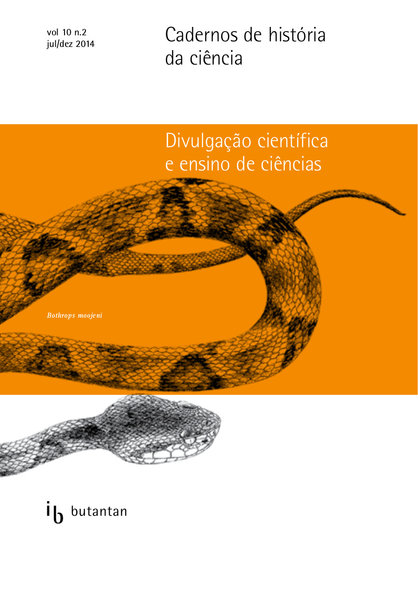Resumo
Muitos autores legitimam o ensino por investigação em razão do seu potencial de promover a construção do conhecimento científico pelo próprio aluno. Um processo investigativo envolve fatores e habilidades como a realização de observações, proposição de hipóteses, uso de ferramentas para coleta, análise e interpretação de dados, proposição de respostas, explicações e a comunicação dos resultados. Um dos modos de articular o ensino investigativo com a natureza da ciência tem sido explorado por Allchin (2013). Os trabalhos desse autor focam a maneira como o professor deve desenvolver habilidades para ensinar sobre a natureza da ciência (NOS). Neste trabalho discorremos sobre as especificidades de uma atividade investigativa elaborada na perspectiva da NOS no Museu de Microbiologia do Instituto Butantan. A forma como esses elementos encontram-se organizados evidencia quais são os limites e as potencialidades do uso dessas metodologias em espaços não formais de ensino.
Referências
______; Andersen HM; Nielsen K. Complementary approaches to teaching Nature of Science: Integrating student inquiry, Historical cases, and Contemporary cases in classroom practice. Sci. Educ., v(98), n(3): 461-486, 2014.
Barrow LH. A Brief History of Inquiry: From Dewey to Standards. Journal of Science Teacher Education, n(17):265-278, 2006.
Bybee RW. Teaching science as inquiry. In: Minstrell J.; Van Zee E. Inquiring Into Inquiry Learning and Teaching in Science. Washington: American Association for the Advancement of Science, 2000, pp.21-46.
Carvalho AMP et al. El papel de las actividades en la construcción del conocimiento en clase. Investigación en la escuela, n(25), pp.60-70, 1995.
Chagas CJR. Nova tripanozomiaze humana. Estudos sobre a morfolojia e o ciclo evolutivo do Schizotrypanum cruzi n.gen., n.sp., ajente etiolojico de nova entidade morbida do homen. Mem. Inst. Osw. Cruz, (1), pp.159-218, 1909.
Delaporte F. A doença de Chagas: história de uma calamidade continental. Trad. Carmem Pereira e Leonora de Assis. Ribeirão Preto: Holos, 2003a.
Munford D; Lima MECC. Ensinar ciências por investigação: em quê estamos de acordo? Revista Ensaio, v(9), n(1), 2007.
National Research Council. Science Education Standards. Washington, DC: National Academy Press, 1996.
Pittella JEH. O processo de avaliação em ciência e a indicação de Carlos Chagas ao prêmio Nobel de Fisiologia ou Medicina. Rev. Soc. Bras. Med. Trop. 42 (1): 67-72, jan-fev, 2009.
Praia J.; Gil-Pérez D.; Vilches A. O papel da Ciência na educação para a cidadania. Cienc. educ. v(13), n(2): 141-156, 2007.
Teixeira AS. A pedagogia de Dewey. In: Dewey J. Vida e educação. 10ªed. São Paulo: Melhoramentos, 1978.
Trópia G. Prática de ensinar Biologia através de atividades investigativas: primeiras reflexões sobre o que dizem os trabalhos apresentados em encontros de ensino de Biologia. Revista SBEnBio, n(3), 2010.
